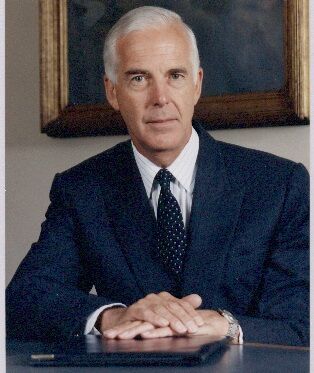"The Gulf War was transformational for the RAF" – Sir Michael Graydon
Published:
Categories:
Iraq,
To mark the 30th anniversary of the end of the Gulf War, Sir Michael Graydon shared his memories of the conflict and discussed its impact on the Royal Air Force as a whole.
By the time war was declared in January 1991, Sir Michael, then Commander in Chief of Support Command, had been leading the Command’s five-month long effort to be ready for it. When Iraqi President Saddam Hussein invaded Kuwait the previous August it set in motion an operation to prepare for war should the peace talks fail, codenamed Operation Desert Shield.

Sir Michael explained: "Support Command's role was training, engineering and supply and carrying out general admin for the RAF, in particular supporting Strike Command.
"Always before a war there is a period in which the diplomatic process is very apparent and one hopes they are successful because no-one wants to go to war. At the same time, we were having to make it very clear to Saddam and the rest of the world that we were serious. And of course, there was the threat that while he had taken Kuwait, he could have invaded Saudi Arabia as well.
"We had to be there quickly and when you are there, you have got to be there in a way that makes it very clear you are prepared to go to war."
When talks broke down the RAF was ready to respond immediately, launching what was the first conflict of a generation, known as Operation Desert Storm. The UK joined forces with the United States supported by more than 30 other nations to expel Saddam Hussein’s occupying troops.
Sir Michael continued: "The RAF's role was pivotal. It was key to the operation that the RAF was able to react with such speed and to get troops and supplies there. we took part in coalition operations to destroy Saddam's aircraft, his airfields, his air defences. The RAF in particular hunted for his Scud missiles and played an important part in attacking his infrastructure. Air was paramount in that we were able to do this with very few losses, compared to the Iraqis."
While the coalition troops suffered relatively few casualties, several Tornadoes were shot down and their crews captured and tortured. Amidst global outcry, the men were paraded on national TV and spoke under duress. Saddam's show of strength designed to undermine coalition forces morale,, in fact had the opposite effect, galvanising their efforts to see the conflict end as quickly as possible.
Sir Michael explained: "At the time, I think I and everyone around me was angered. The biggest mistake was to parade them on TV. It showed how miscued Saddam was in his PR. He thought it would frighten our forces, that they would see the brutality and the way prisoners had been beaten into saying certain things. But it made all of our troops determined they would fight."
Following the conflict, Sir Michael went on to become Commander in Chief of Strike Command, eventually serving as Chief of the Air Staff before he retired in 1997, after a 40-year career. He believes the Gulf War had a lasting legacy on the RAF and how it operated in a theatre of war.
He added: "The Gulf War was transformational because of what it showed us. It showed us that the precision weapons that the Americans had, and we were just beginning to employ, were capable of carrying out operations with incredible accuracy, reducing collateral damage and the numbers of aircraft needed for effect."
Sir Michael Graydon is a Life Vice-President of the RAF Benevolent Fund and long-term supporter of its mission to ensure no member of the RAF faces adversity alone.